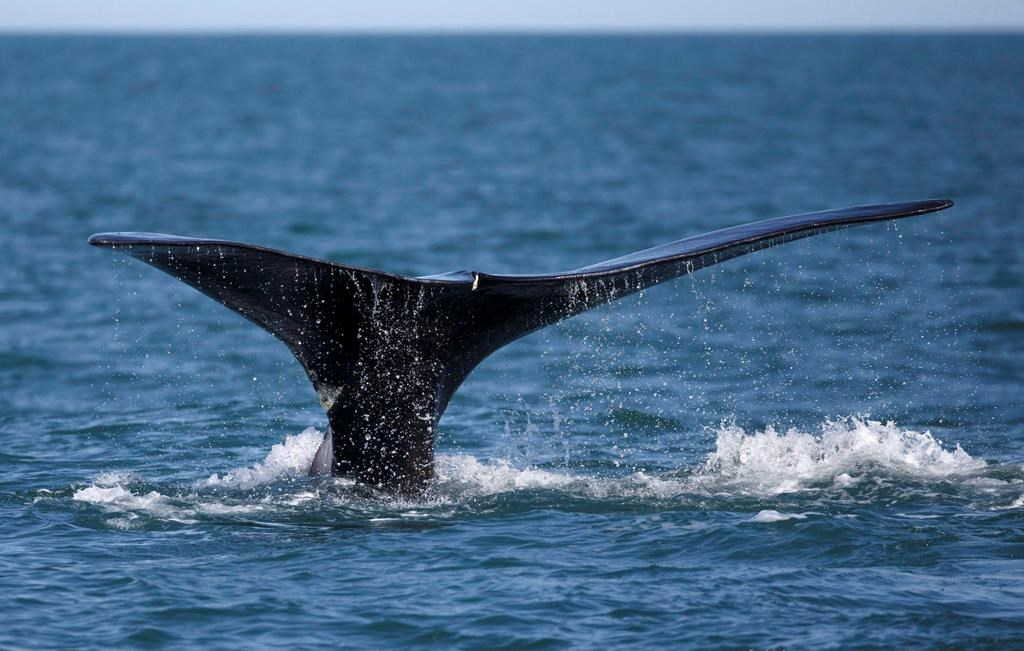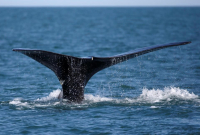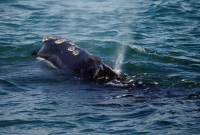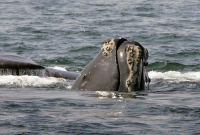Support strong Canadian climate journalism for 2025
North Atlantic right whales are now considered one step away from complete eradication.
The International Union for Conservation of Nature is moving the whales from "endangered" to "critically endangered" on its red list of global species facing threats to their survival.
The only step beyond "critically endangered" is extinction.
Fewer than 250 mature whales were known to exist at the end of 2018, in a total population of only about 400.
More than 30 whales have been killed by ships or fishing gear entanglements in the last three years, two-thirds of them in Canadian waters.
The conservation group classified right whales as endangered in 2008, and since then the population has declined more than 15 per cent.
Sean Brillant, a senior conservation biologist with the Canadian Wildlife Federation in Halifax, says the change in status is not surprising and should put even more pressure on governments in Canada and the United States to do more to stop these whales from being wiped out.
"We are an affluent country with an incredible amount of knowledge and resources, we have good controls over our oceans industry," he said. "And we can't figure this out? How embarrassing. We need to step up and solve this problem."
He said Canada has done a lot in recent years to try to protect the whales, including closing fisheries and implementing speed limits for boats. This year, more than 12,000 square kilometres of the Gulf of St. Lawrence has already been closed to fixed-gear fishing until November, because so many North Atlantic right whales were spotted in the region this summer.
Department of Fisheries and Oceans rules close about 2,000 square kilometres for 15 days around a place where a whale is spotted; if a whale is spotted within that area again in that period, the area closes for the rest of the season.
Brillant said it's still not enough. Oceans Canada recently called on Ottawa to make speed limits in the Cabot Strait mandatory instead of voluntary after research showed most ship captains were choosing not to follow it. The Cabot Strait is the entrance to the Gulf of St. Lawrence between Newfoundland and Cape Breton that most of the whales use.
Brillant also said speed limits are better than nothing but the only full solution is to prevent the ships from going near the whales at all.
Amy Butcher, a spokeswoman for Transport Minister Marc Garneau, said the government has mandatory speed restrictions in most of the Gulf of St. Lawrence, and this year imposed a new restricted area that requires ships to stay away or reduce speeds even further from 10 knots to eight.
"Our government takes the protection and recovery of the North Atlantic right whale very seriously," she said.
Brillant said so far this year has been positive with no whales dying in Canadian waters thus far. Two calves have died in American waters, and one of their mothers has not been seen since the calf showed up dead. Both calves were killed by ships, and one was hit by ships twice in its seven months of life.
The whales, which migrate along the eastern coast of North America, spend winters off Florida and Georgia before migrating north to New England and Atlantic Canada in the summer.
The whales are threatened by a combination of factors, including climate change, which appears to be driving them further north in the summer months to find food. Brillant said before 2017, surveys of the whales in the Gulf of St. Lawrence were limited, but when that work began in more detail, it was clear there were a lot of whales present in waters that opened them up to serious risk of being hit by big ships or tangled in fishing lines.
Brillant said in addition to the 31 whales that have died, at least another 10 have been entangled with fishing gear, most of them in Canada. Whales tangled up in fishing gear are "as good as dead" because they cannot reproduce and their prospects for survival are not good.
"We are not going to be graded on good intentions and good decisions unless we get the results. And the results have to be that we don't drive this species to extinction."
This report by The Canadian Press was first published July 9, 2020.





Comments
I wondered if there was a way of sending an underwater audio alarm from a ship that would signal approaching danger to any whales? Sort of like fog horns do for ships. The audio devices would be attached to the ships before they enter the area and removed when they leave. The cost of the devices could be shared.
As a society, Canadians to our grave detriment ,seem willing to believe the lies and half truths of our own propaganda about how advanced and sane we are.
Even compared to the vicious and cruel kingdom to the south which we LOVE to smugly sneer at ,we are more lax lazy and docile in the service of capital and elites.
not mandating speed limits and patrolling with gunships to enforce that speed limit is only the most heartbreaking example of the moment. Not legislating track safety and fining the ass of CN and Cp when they kill Canadians and poison the land is DERELICTION OF DUTY if duty rather than enabling greedy bastards was what governing meant.
some days I hope our species goes extinct before we take every other sentient life form down before us